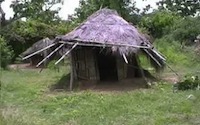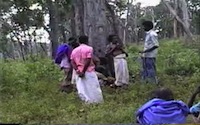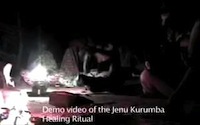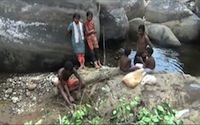Kurumba Languages / Bill-Karayan-Mari-ausKLUDAC001a.wav (audio)
|
(1) ādi kālalu |
kade |
ambadɨ |
Billuru |
kārayan |
makka |
|
From old times |
a narrative |
that is called |
Billuru |
Karayan |
children. |
That what is called a narrative from old times is the narrative of the children Billayan and Karayan.
|
(2) modalu naṅga |
jātigu |
yāvadɨ |
gottu kane. |
|
In old times our |
group/tribe |
anything |
did not know . |
In those older times our group/tribe did not know anything.
|
(3) ivarɨ |
yārne |
kaṇḍalevũa sari ōḍi buḍodu - |
ūru buṭṭoṭṭu. |
|
They |
who ever |
they saw okay they ran away – |
the village they left. |
Who ever they saw - okay they ran away - they have left the village.
|
4) āḷne |
kaṇḍale |
sāku |
alli |
irodille. |
|
people |
to see |
enough |
they |
did not stay there. |
It was enough when they saw people; they did not stay there.
(5) innɨ ante irāga (innɨ) ella jātine kaṇḍoṭṭu ivarɨ kāḍugu buddu buṭṭarɨ.
Then like that it was all groups/tribes they saw they into the forest were running/falling.
Then it was like this when they saw all groups/tribes they started to run/to fall into the forest.
|
(6) ivarugu |
yānuvũa (yānũa) |
gott-āpadille. |
|
For them |
anything |
not able to know. |
They did not not got any knowledge.
|
(7) innɨ gottu |
illādāga |
ivarɨ |
yāna māḍidarɨ. |
|
Then knowledge |
was not there |
they |
what did they do? |
Then, when there was no knowledge what did they do?
(8) innɨ kāḍugu budda mēle kāḍlu ira gālsu jēnu bāḍu soppu
Then, into the forest after falling in the forest what was there roots, honey meat leaves
|
kaṇḍadɨnɨ |
tindɨ |
anuvāsa |
paṭṭoṇ-iddarɨ. |
|
seeing |
eating |
alone |
they were staying/living. |
Then, after they fell into the forest, the roots, honey, meat,leaves that were seeing and eating (them) they were staying alone.
|
(9) |
iddāga |
yāna āgi-ōtu. |
|
They were there |
what happened? |
What happened when they were there?
(10) innɨ nan antavan nin antavan edō (yāvadō) selpa āḷne selpa parice māḍioṇanɨ [palagioṇanɨ].
Then, one like me one like you with a bit people a bit made himself familiar
(11) avanɨ sari "adɨ entuga kurubaru ōgi kāḍu oḷage buddu buṭṭarɨ. naṅga
oṭṭulu iraku" andoṭṭu ivan yāna māḍidanɨ."
|
He (thought)okay: "What? |
For what do |
the Kuruba go |
the forest into (and) fall? With |
|
us they must be (live)" after saying |
he what |
he did he do? |
He thought, okay: "What? For what do the Kuruba go and stay (settle) in the forest? They must live with us" after
saying that what didi he do?
|
(12) ōgi, sari avarne |
karidu |
naṅga oṭṭulu ondige sērsavo. |
|
After going okay them |
let us call |
us with together let them join/gather |
Okay, let us call them and let them join with us together
(13) avarɨ sariāna kāḍugu buddu ōydere (ōyi-iddere) andoṭṭu Billayan. "They the good forest into they went and stay", said Billayan.
"They went into the thick (deep) forest", Billayan said
|
(14) |
kārayan |
makkane |
ella |
karidu kēḷdarɨ. |
|
Karayan |
children |
all |
they called (and) asked (them). |
They called the children of Karayan and asked them.
(15) kēḷdāga naṅgagɨ inta mādiri ūru andale āḷu andale naṅgagɨ
ïḍipadille.
After asking: "For us that kind of village what is called people what is called for us we don't like it.
When they were asked they said: "Concerning that kind of village, concerning people, we don't like it.
(16) naṅga kāḍugeve ōyi buḍaku. naṅga anuvāsa paḍodu kāḍleve badukaku andɨ ōḍi buṭṭarɨ.
"We into the forest must go and stay. We lonliness suffering in the forest we must stay " saying they ran away.
" We must go and stay in the forest. Though we suffer lonliness we must stay in the forest" saying that they ran away.
(17) āga innɨ Billayan makka yāna māḍidaru.
(17) That time then Billayan children what did they do?
What did in those times the children of Billayan do?
|
(18) |
sari ivarne |
kāḍugu buḍodu |
pūra tappu. |
|
|
"Okay, them |
in the forest to leave |
(is) big |
mistake." |
Okay, it is a big mistake to leave them in the forest.
|
(19) |
naṅga oṭṭulu |
ivarne |
sērsavo (sērsaku??) |
andɨ |
naṅgane |
idu |
|
māḍioṇ-iddarɨ. |
||||||
|
"Us together |
them |
we must make to join |
" saying |
to us |
that |
they were making.
They said "we must make them to join with us" and did that to us.
|
(20) idu |
māḍodu |
yāna. ella |
īga |
ondige |
sērale |
ella |
āḷu |
mātāḍi-ātu. |
|
This |
to do |
what? All |
now |
together |
to come |
all |
people |
talked with |
each other.
What was it useful for to do that? To join now all people talked (with each other).
|
(21) sari |
avarne |
entegāru |
taraku. |
buḍa bāradɨ. tandu naṅga oṭṭulu |
|
|
sērsavũ |
andoṭṭu |
naṅgane |
ella |
ōsi |
'ṭrayi' māḍidarɨ - tandu sērsale. koḷḷavōtu. |
"Okay, them somehow one has to bring. One must not drop. Bringing us with
let join" saying us all a bit they tried to bring and join. Not able to. Okay, somehow one has to bring them. One must not aufgeben. Let them bring here and join with us." they said and then they tried a little bit to bring us all here and to join us. They were not able to.
(22) inde innɨ avareve innɨ deyiva-gīva(gu) ella pūra oṭṭuge avarɨgeve -
naṅga deyiva avarɨgeve sonta.
After that then they then our deities all very much build up – for them our deities for them kin.
After that then they build up our deities all very much, to make our deities kin with them.
|
(23) naṅga |
mandi |
ella |
iddāga |
deyiva-gīva ella ākidarɨ - deyivane. |
|
our |
people |
all |
were there |
deites all they put - deities |
Our people all were there (and) deites all they put - deities
(24) innɨ avarɨgɨ buṭṭoṭṭu ōḍi buṭṭarɨ.
Then them they left ran away. (disappeared)
Then them they left and ran away. (disappeared)
|
(25) |
(īga) ā deyiva |
naṅgagu |
sēr paṭṭa [sēru paḍodu] |
deyiva |
ta alla. |
|
Now these deities |
to us |
belonging |
deities |
these indeed. |
Now these deities were deitites that belonged to us.
26) (īga) avarɨguvũa naṅgagu sonta ta ittu modalu.
Now for them themselves for us kin itself they were in the beginning.
Now for them themselves and for us kin itself they were in the beginning.
|
(27) |
naṅga |
avarne |
kaṇḍu |
oḍi buṭṭa |
naṅga(gu) |
bēre bēre |
āgi-ōdeõ. |
|
We |
them |
seeing |
ran away |
we |
other other |
we became. |
Because we after seeing them ran away we became different.
28) avarɨ selpa mēle naṅga selpa keḷage.
[ Marī commentary: billayan mēle, kārayan keḷage - jēn-kurubaru]
They a bit high we a bit low
They a bit higher, we a bit lower - [ Mari's Commentary:] Billayan is up, Karayan down – the Jenu Kurumba
(29) ante iddāga sari ivarɨ enteve naṅga deyivaneetti
koṇḍāḍioṇ-iddāga sari naṅgavũa (nangũa) buḍa bāradɨ.
Like that living okay "they which way ever our deities have taken okay we also must not drop [the deities]
Living like that is okay "Which way ever our deities they have taken and celebrating" okay we must not drop them (the deities)
(30) nan antavan buddi iddavanɨ sari buḍa bāradɨ. nānu adɨne ā
deyivane ettaku andoṭṭu yāna āgi-ōtu.
I such a one knowledge this such one "okay must not drop. I them those deities must take " saying what happened?
What happened after one like me, one who was smart, said:"Okay, we must not drop them. I must take them, those deities.
|
(31) |
ā deyiva |
tanagu |
ōpadɨgu |
avanugu |
naṅagu |
ondē |
āgi-ōtu. |
|
Those deities |
near |
to go |
for him |
for me |
one |
it became. |
Going near to those deities for him and for me one it became.
|
(31) avanɨ |
bandɨ buṭṭanɨ |
nān |
ōyi buṭṭenɨ. |
|
He |
came |
I |
went away. |
(When ) He came (in old times) I went away.
(33) adɨ ente īga naṅagu deyiva bēku andoṭṭu bandɨ buṭṭe andɨ
avan inde kēḷdanɨ - aṇṇanɨ
That how? "Now for us deity we need" saying "come and drop" saying
he today is calling – the elder brother
That is how? Nowadays "I need a deity" having said "come and drop" saying he is calling/asking (us)– the elder brother
|
(34) |
innɨ |
naṅga |
aṇṇanɨ |
tammanɨ |
ondige |
iddamo. |
|
Then |
we |
elder brother |
younger brother |
together |
we should be. |
Then we elder brother and younger brother should be together.
(34) innɨ nīnu ōgāde ettuguvũa (ettagũa) ōgāde. ninagu deyiva ta alla bēku. [naṅga]
ondige ba.
Then you don't to go anywhere, don't go. For you a deity itself is needed. [Let] us together come.
"Now you don't to go anywhere, don't need to go. You need a deity. Let us come together." [eBr. said]
(35) nānu nīnu aṇṇan tamman innɨ mēle. nīnu bēre andɨ
kāḍugu buddu buḍāde.
"I you elder brother younger brother then after. You are different" it is said
"forest must not leave".
"I and you we are elder brother younger brother from now on. [Even though] You are different" it is said "you must not leave the forest".
|
(36) |
innɨ nānu bēre |
andoṭṭu |
aṇṇan |
ta alla |
bēku. |
|
Now I'm different |
it is said. |
Elder brother |
itself |
is needed |
Now [even though]I'm different it is said. Elder brother itself is needed.
|
(37) |
āga sari |
aṇṇan |
tammane |
karidɨ ōgi |
innɨ, sari, avan |
||
|
manelu |
oḷḷedu |
keṭṭadɨ |
mādi |
tinsi (tinnɨsi) |
kuḍisi |
||
|
iragāgi |
īga |
ondige iddeve. |
|||||
|
Then okay |
elder brother |
younger brother |
having called and went |
then okay in his |
|||
|
hut |
good and |
bad |
is made |
is made to drink |
made to eat |
||
|
after being |
now |
together |
they are. |
Then okay after the elder brother having called the younger brother, then okay after in his hut good and bad is made,
[the younger brother] is made to drink and made to eat after being like this now they are together.







